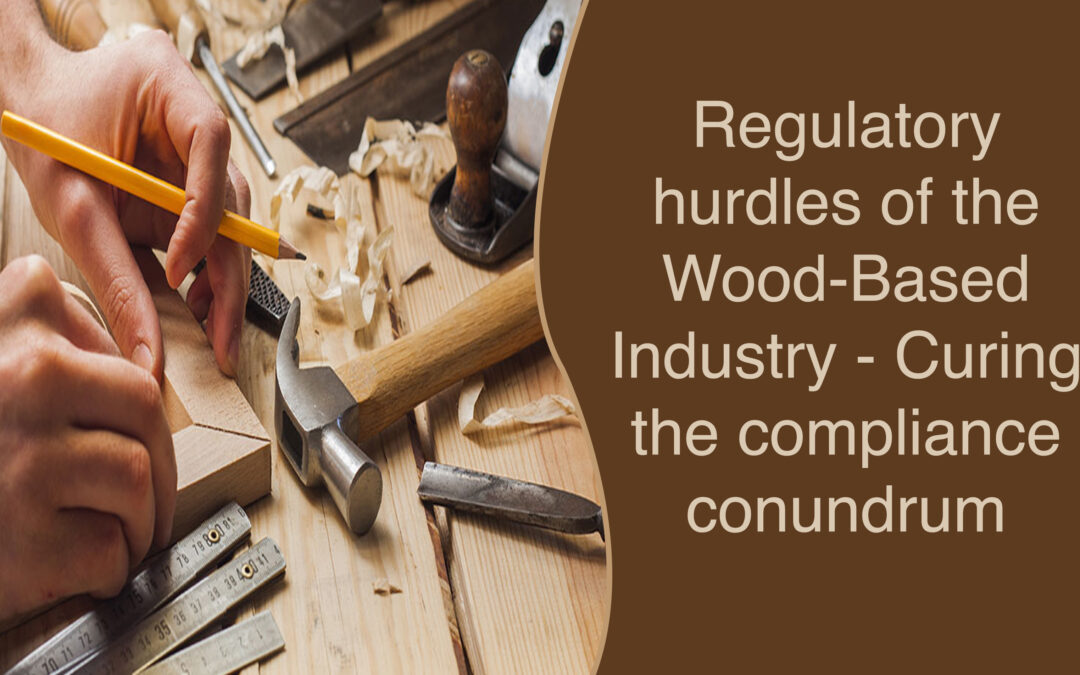Wood in any form has always been of the most widely used products for rural and urban household alike. With the Indian economic reforms and the resultant rise in income there has been a rapid increase in the consumption of wood and wood-based products. This rise in demand with a reducing supply from forests had led to a gap between the demand and supply of wood and wood-based products. The National Forest policy, 1988 has brought about a significant shift towards using forests for conservation and preservation. It further emphasized upon ‘Trees outside forests’ to reduce the pressure on forests and therefore reduce this gap between demand and supply of wood. Since the wood-based industry heavily impacts the environment and with the ongoing concerns of deforestation and environmental degradation the Central Government along with numerous State Governments have formulated various laws and policies to be able to regulate the setting up of wood-based industries.
Setting up a Wood Based Industry
1. The Wood-Based Industries (Establishment and Regulation) Guidelines, 2016
Wood-Based Industries (Establishment and Regulation) Guidelines, 2016 under its guideline 2(k) defines a wood- based industry as; “any industry which processes wood as its raw material (Saw mills/veneer/plywood/pulp or any other form such as sandal, katha wood etc.)”.
The guidelines further mention under guideline 3 about the constitution of a state level committee in every state in India. The committee shall be responsible for the assessment on availability of timber every 5 years and maintain a database for the same. The committee will also approve the names of the wood-based industrial units which maybe under consideration for the granting of a fresh license as given under the powers and functions of the committees mentioned under guideline 4.
The committee will also approve the names of the wood-based industries which maybe under consideration for the granting of licenses.
The guidelines place restrictions on location of wood-based industries. In Union Territories/States (other than North-Eastern States), with regard to distance from the boundary of nearest notified forests or protected areas, wood-based industries will be allowed to operate as per state-specific order/approval of the Hon’ble Supreme Court or High Court of the concerned state empowered committee.
Guideline 8 of the Wood Based Industries (Establishment and Regulation) Guidelines, 2016 explicitly mentions that for any license to be granted or renewed for a wood-based industry, prior permission will have to be obtained from the state level committee. Such license shall be valid for a period of five years and thereafter shall be renewed from time to time. It is further mentioned under guideline 11 that every wood-based industry shall regularly update as well as maintain records in a proper format as may be prescribed by the concerned Union territory or State.
2. Amendment to regulate wood-based charcoal industries
Through an order dated 13th August, 2018 the NGT recently directed the regulation of wood-based charcoal industries by way of an amendment to the Wood-Based Industries (Establishment and Regulation) Guidelines, 2016.
The changes introduced by the new amendment are as follows:
- The definition of wood-based industry was amended to include industries processing wood as its raw material (Saw mills/veneer/plywood or any other form such as sandal, Katha wood, charcoal etc.)
- Introducing the definition of charcoal to be a form of carbon which is derived from the incomplete combustion of wood which has been derived from a tree.
- Mandates all wood-based industries to follow environmental regulations as may be prescribed under the Central and State Acts including the Environment (Protection) Act, 1986 as prescribed by Pollution Control Boards at Central or State level or the Ministry of Environment, Forest and Climate Change.
3. Application for license for a wood-based industry
The procedure of applying for license for a wood-based industry varies from state to state. Every state has a different procedure that needs to be followed. However, every state and Union Territory must conform their state-specific rules governing wood-based industries in line with the Wood Based Industries (Establishment and Regulation) Guidelines, 2016.
Key compliances for wood-based industries under Central Laws
Factories Act, 1948
- An applicant who wishes to setup a sawmill in India, should get the site approved under section 6 of the Act.
- The plan must specify the plans for the factory and what the applicant wishes to manufacture in it and then register the factory.
- He also needs to ensure that the safety measures and policies are in place under chapter IV of the Act such as, ensuring proper lubrication of machinery, wearing suitable gear while working with dangerous machines and tightening every screw and bolt of the machines.
Water (Prevention and Control of Pollution) Act, 1974 (obtaining permission from State Pollution boards)
To set up a sawmill, the applicant will have to obtain permission from the State Pollution boards as well before establishment. The Water (Prevention and Control of Pollution) Act, 1974 is applicable on factories, establishments, people in India, who might be discharging effluents from the factories etc. into streams, sewage, or nearby waterbody.
Noise Pollution (Regulation and Control) Rules, 2000 (measures to ensure that the noise levels do not exceed ambient air quality standards)
Due to the kind of machinery that is used in cutting of timber and in wood-based industry, the application of Noise Pollution (Regulation and Control) Rules, 2000, is a given.
- Under Rule 3, the State Government is given the responsibility of taking measures to ensure that the noise levels do not exceed ambient air quality standards which is 75 DB during daytime and 70 DB during night time in industrial areas.
- Rule 5A restricts the usage of sound emitting machinery during night-time.
Conclusion
One can conclude that the wood-based industry is one of the most heavily regulated industries which are governed by the Central and the State Governments to ensure that the industry is adequately regulated and at the same time the environment is protected. Recently, in a case The Ministry of Environment, Forest and Climate Change (MoEFCC) cancelled the licenses given to about 50 sawmills, in lieu of the controversial issue of additional horizontal band saw (AHBS). It further states that if licenses were to be granted to such sawmills without conducting a proper timber availability report it could pose a major threat to the environment. The National Forest Policy (NFP), 1988 also takes a similar stand which further highlights the need for assessment of availability of timber for wood-based industries and it is the responsibility of State Level Committees (SLCs) to ensure the same.
The role of compliance officers in every organization is to ensure that the organizations stay abreast with all the rules and legal compliances applicable to them and reduce the risk of penalties in case of non-adherence with law. Maintaining a streamlined and automated compliance management system with features like an automated compliance calendar, regulatory updates and customized compliance status reports would help manage all these compliances in an effective manner.
Written by: Nishtha Chakrabarti
Disclaimer
All material included in this blog is for informational purposes only and does not purport to be or constitute legal or other advice. This blog should not be used as a substitute for specific legal advice. Professional legal advice should be obtained before taking or refraining from an action as a result of the contents of this blog. We exclude any liability (including without limitation that for negligence or for any damages of any kind) for the content of this blog. The views and opinions expressed in this blog are those of the author/(s) alone and do not necessarily reflect the official position of Lexplosion Solutions. We make no representations, warranties or undertakings about any of the information, content or materials provided in this blog (including, without limitation, any as to quality, accuracy, completeness or reliability). All the contents of this blog, including the design, text, graphics, their selection and arrangement are the intellectual property of Lexplosion Solutions Private Limited and/or its licensors.
ALL RIGHTS RESERVED, and all moral rights are asserted and reserved.





